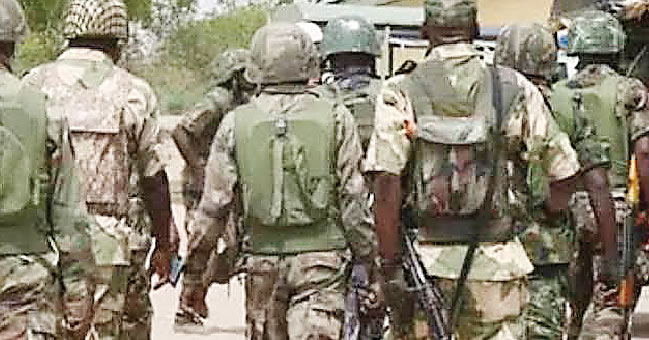
of a senator’s aide, Adeniyi Sanni, by alleged killer-soldiers. Soldiers and Lagos State Traffic Management Authority officers engaged in a free-for-all in Oshodi and Ojota a week after. Soldiers also reportedly killed a commercial driver in Iyana-Ipaja a few days after that public brawl. All this suggests systemic indiscipline, lack of effective control, and disdain of the military for civilians.
These incidents and many others painfully demonstrate that Nigeria’s military is not attuned yet to the ethos of democracy. In Sanni’s case, an aide to the senator representing Ogun West, Solomon Adeola, soldiers reportedly requested his vehicle particulars at the Ojodu-Berger area on his way home. His wife forwarded the images to him on the phone. Events then took a shocking turn; her husband’s corpse was later discovered kilometres away at Oshodi the next day.
A few days later, the shameful images of soldiers engaged in street brawls with LASTMA officials at Ojota and Oshodi flooded the media. The soldiers reportedly injured about 15 LASTMA officials in the fracas. A later footage also showed a LASTMA officer pummelling a soldier. This is unacceptable. In November 2022, soldiers driving against the traffic on Eko Bridge descended on LASTMA and police officers for daring to ask them to obey traffic rules.
As usual, the Army authorities later staged a photo-op at LASTMA HQ, where the ‘quarrel’ was ostensibly settled. The public should not continue to endure such callous deflection from accountability each time ill-disciplined soldiers go on the rampage. Undoubtedly, the lawlessness will continue until rogue soldiers are not only dismissed but are also prosecuted. Under Nigerian law, crimes of assault, traffic violations and murder are not to be resolved by ‘esprit de corps’ banter among official agencies; investigations, arrests and prosecution are the just demands of the law.
In the third case, soldiers waylaid a driver, identified simply as Lawal, in Iyana-Ipaja, seized the brand-new car he was to deliver to its owner in Abuja and murdered him. In its defence, the military went into default mode: there are impersonators wearing military uniform to commit crimes, it said. This is hollow. It is the responsibility of the military to fish out impersonators.
Amnesty International has accused the Nigerian military of arbitrary arrests, mass detentions, disregard for human rights, and extrajudicial killing of 150 members of the Indigenous People of Biafra separatists since 2017 in the South-East.
Increasingly, soldiers are involved in extortion on highways. In Ibadan, Oyo State, one rogue officer brutally assaulted a civilian allegedly for “not greeting him.”
In the past, the military disgraced itself by staging coups, seizing, and making a mess of governance. Out of power, it has not imbibed the culture of military subordination to civilian authority. Officers and even lowly ranks hold civilians in contempt.
The citizens in turn distrust the military institution and regard it as occupation force. At various times, the military has engaged in massacres; notably at Odi, Bayelsa State, and in Zaki Biam, Benue State. Three years on, the government and the military are still denying the lethal assault on Nigerian youths by soldiers during the 2020 #EndSARS youth protests against police brutality at the Lekki Tollgate, Lagos.
The military subordinating itself to civil authority is a cardinal principle in democracies. In 2018, the United States Air Force demoted an officer from her supervisory role for making “racially insensitive comments about her subordinates.”
The continued deployment of soldiers in all the 36 states is dangerous and should give way to effective devolved, state policing.
The political leadership at every level, executive and legislative, must push back against military oppression and rise decisively to the defence of assaulted civilians.
Newly-appointed service chiefs should instil a culture of discipline in the military. Soldiers are not above the law and have no right to take the law into their hands. When they do arrest suspects, they must hand them over to the police.
Military chiefs should redefine the rules of engagement with the civilian populace and punish lawless officers expeditiously.





